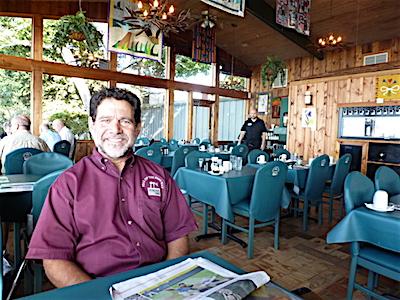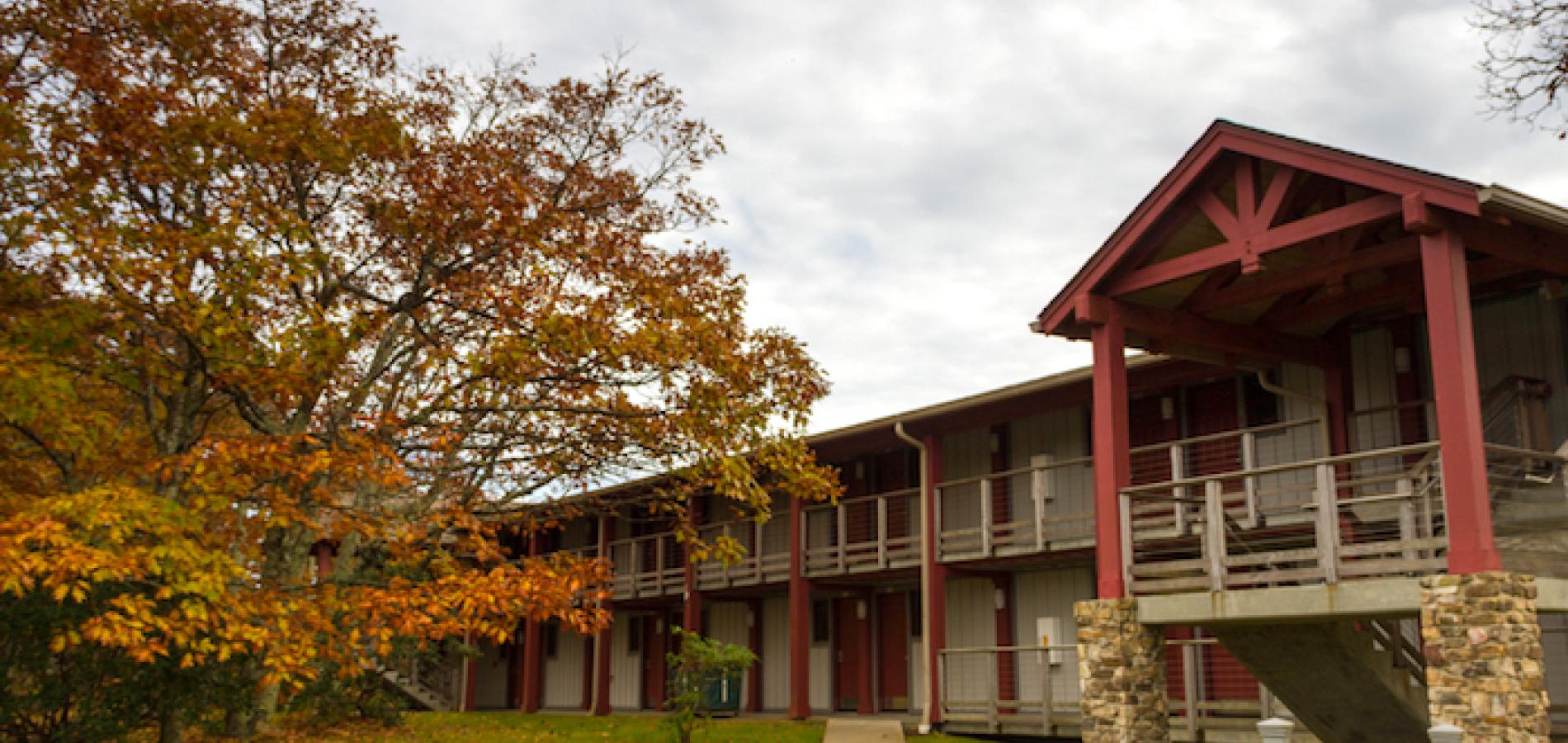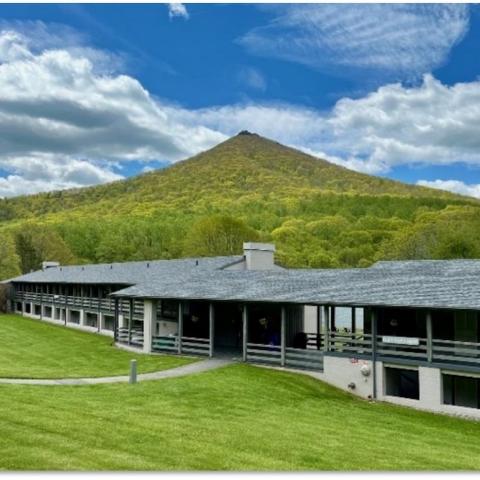We recently enjoyed a stay at Pisgah Inn on the Blue Ridge Parkway, a two-lane strip of asphalt that winds 490 miles through the western portions of North Carolina and Virginia. Pisgah Inn and Peaks of Otter Lodge are the last lodging facilities operating on the parkway following the closure of Bluffs Lodge and Rocky Knob Cabins for lack of a concessionaire.
We have stayed at Pisgah Inn on several previous occasions. The mountain views are superb and the food has always been among the best served in a national park lodge. In 2015 the readers of USA Today voted Pisgah Inn “Best National Park Lodge.”
The inn is one of a dwindling number of independently operated national park lodges, most of which are now run by large corporations with diverse operations over several parks and associated businesses. Other independents include Triangle X in Grand Teton National Park in Wyoming, Sacred Canyon Lodge in Canyon de Chelly National Monument in Arizona, Ross Lake Resort in North Cascades National Park in Washington, Kettle Falls Hotel in Voyageurs National Park in Minnesota, and the Inn at Brandywine Falls in Cuyahoga Valley National Park in Ohio.
The Pisgah Inn operation has been in the same family for four decades. Current head, Bruce O'Connell, has been involved in the lodge from the time his parents became investors in the late 1970s. Perhaps you remember him best when he fought to remain open during the 2013 government shutdown. We thought it would be interesting to sit down with concession holder Bruce and listen to his thoughts on operating a national park lodge. The following is an edited version of our conversation.
Traveler: So how did you end up at Pisgah Inn?
Bruce: Retired and living in St. Petersburg, Florida, my mother and father were looking for a new challenge when they saw a Wall Street Journal advertisement seeking a manager for a North Carolina lodge. At the time I had graduated from the Cornell School of Hotel Management and was working as the food and beverage manager at a Hilton on the East Coast. Dad called and asked if I could drive down to North Carolina to meet them and offer an opinion on the business.
Traveler: So, you gave them a favorable opinion?
Bruce: I drove down and checked it out. The inn was constructed in 1964, in disrepair, located in an area that was “backward,” and sort of uninteresting to me. However, I thought it would work for my parents, who told the owners they were interested, but would only manage the facility as part owners. A deal was struck allowing us (as a family) to acquire a one-third interest in the operation. I had returned to my regular job when dad called and asked if I could come down and help them run the inn for a year. I returned to Pisgah and never left. As the decades rolled by, our partners sold their interests to us until we are now the sole owners of the business.
Traveler: Are you still the day-to-day manager after nearly 40 years?
Bruce: I was the everything, every-day manager for over 30 years. About eight years ago I realized I would not last forever and that I should start setting up a leadership team that could take Pisgah Inn into the future. I have slowly backed away during the last eight years and the inn is better than ever. Go figure! I spend about 30 percent of our seven-month season at the lodge. I like to travel and want to see other parts of the U.S. and the world before I'm too old or unable to enjoy it. On a positive note, my mother is 92 and still quite active with an interest in Pisgah Inn, so I hopefully have a number of years remaining to enjoy life. Don't get me wrong, though. I care deeply about Pisgah Inn and it remains an important part of my life.

Bruce O'Connell, owner of the Pisgah Inn/David and Kay Scott
Traveler: How do you make certain things continue running smoothly when you are absent?
Bruce: I have an excellent staff that does a great job handling operations at the lodge. They know I'm available if a problem develops. I also keep current on the experiences of our guests. We encourage all our guests to fill out comment cards and drop them in a box when they depart. I read all the comment cards, all the remarks on Trip Advisor, and all guest comments sent via email. (When leaving our meeting we noticed Bruce pulled the comment cards that had been deposited by guests and took them with him.)
Traveler: What's the most difficult part of operating the lodge?
Bruce: Food service is always an issue in the hospitality industry and our facility is no exception. Someone has to stay on top of the menu, the ordering, the food quality, and the customer service. If the food and beverage service isn't top notch, the entire operation is at risk. Our chef offers a core menu required by the NPS concession officials, but also includes a number of special menu items of which he is quite proud. NPS must approve offerings and prices for the core menu, but they allow us to offer more upscale items with limited restrictions on what we can charge. We operate in a market-driven area. Many locals choose to drive a considerable distance in order to eat in our dining room. This is a sign we are doing something right.
Traveler: Any other issues?
Bruce: Yes, staffing is another continuing challenge in the hospitality business. We have approximately 100 people working at Pisgah Inn. To help retain our top staff I have five of our most important employees on an annual salary, although the inn is open seasonally. They have work-related things to do in the off-season, of course, but I believe having them as full-time employees reduces turnover and helps maintains consistency for our guests.
Traveler: How did such a small facility win USA Today's poll for “Best National Park Lodge?”
Bruce: We have very loyal guests, many of whom return year after year for special occasions or simply to get away from home for a day or two. They enjoy the inn, our employees, and the atmosphere we offer. When I learned we had been nominated I called their attention to the poll and many of them voted each day. We were able to carry the day, but it was a horse race and I was sweating a little before the final result was posted. I'm proud of the win, especially for our staff. Our mission is that every visitor and employee leave here with a positive memory or experience of Pisgah Inn. I think our win in the USA Today voting validates that we are achieving our stated mission.

With views like this, it's understandable why many guests at the Pisgah Inn are repeat guests/Pisgah Inn
Traveler: You received a lot of national attention in 2013 when you defied the federal government shutdown and National Park Service order to close Pisgah Inn. What made you decide to fight the closure?
Bruce: I decided to fight the closure after considering my employees' best interests first, and secondly, my personal beliefs and conscience. In my opinion, it simply was not right or legal for Pisgah Inn to be closed. I hired a lawyer and we won. So, we reopened. It was that simple.
Traveler: What are you doing on the environmental side?
Bruce: I constantly look for ways to improve our environmental footprint. Several years ago we started a program that we call cardboard backhauling. We end up with large amounts of empty cardboard boxes, so we asked one of our suppliers if he could haul our cardboard back down the mountain after delivering our supplies. We have converted two of our vehicles to operate on used French fry oil. We installed solar to heat water used in the kitchen, and we installed solar panels on the roof of one of our lodge buildings to reduce our electric bill. During the winter when we are closed, we sell electricity back to the power company. There is much more and I enjoy bragging about it.
Traveler: Your contract was renewed for ten years in 2014. Do you plan to enter a bid again in 2024?
Bruce: It is becoming very difficult and expensive for an independent to bid on National Park Service contracts that have become increasingly complicated. Unlike the previous two contract bids that I wrote (on a typewriter!), this time I hired a consultant at substantial expense. Before making the decision to bid, I asked my staff for their opinion and told them I would be bidding for them as well as myself. They encouraged me to bid so that we could continue what we believe has become a successful pursuit of offering a great visitor experience. We all knew that this was a special place, a one-of-a-kind. We had a connection.












Comments
We love the Pisgah Inn! The views are incredible. The food is very good. My only regret: They have become so popular, I couldn't get a reservation in mid October (and I inquired in June)!
This area is close to my childhood home so I know how beautiful it is.Thanks to your incredible pictures more of your readers will be able to share its beauty as well. It is always wonderful to hear about the little guy winning over the conglomerate .Great job Bruce.Wish there were more like you.Thanks for your heartfelt article ;t gave me lots to smile about.